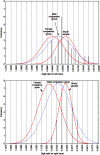Feminist activist women are masculinized in terms of digit-ratio and social dominance: a possible explanation for the feminist paradox
- PMID: 25250010
- PMCID: PMC4158978
- DOI: 10.3389/fpsyg.2014.01011
Feminist activist women are masculinized in terms of digit-ratio and social dominance: a possible explanation for the feminist paradox
Abstract
The feminist movement purports to improve conditions for women, and yet only a minority of women in modern societies self-identify as feminists. This is known as the feminist paradox. It has been suggested that feminists exhibit both physiological and psychological characteristics associated with heightened masculinization, which may predispose women for heightened competitiveness, sex-atypical behaviors, and belief in the interchangeability of sex roles. If feminist activists, i.e., those that manufacture the public image of feminism, are indeed masculinized relative to women in general, this might explain why the views and preferences of these two groups are at variance with each other. We measured the 2D:4D digit ratios (collected from both hands) and a personality trait known as dominance (measured with the Directiveness scale) in a sample of women attending a feminist conference. The sample exhibited significantly more masculine 2D:4D and higher dominance ratings than comparison samples representative of women in general, and these variables were furthermore positively correlated for both hands. The feminist paradox might thus to some extent be explained by biological differences between women in general and the activist women who formulate the feminist agenda.
Keywords: beliefs; digit ratio; dominance; evolutionary psychology; feminism; gynephilia; personality; testosterone.
Figures


References
-
- Abowitz D. (2008). The Campus “F” Word: feminist self-identification (and not) among undergraduates. Int. J. Soc. Family 34 43–63
-
- Bogaert A. F. (2000). Birth order and sexual orientation in a national probability sample. J. Sex Res. 37 361–368 10.1080/00224490009552059 - DOI
LinkOut - more resources
Full Text Sources
Other Literature Sources

